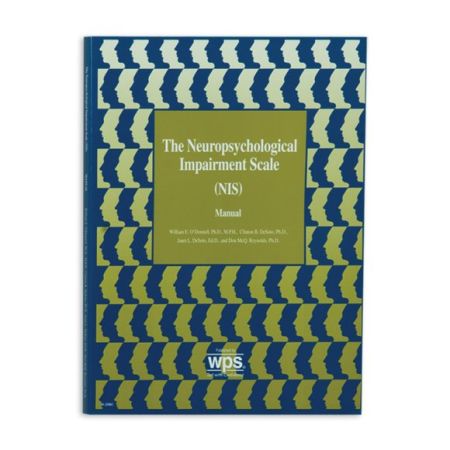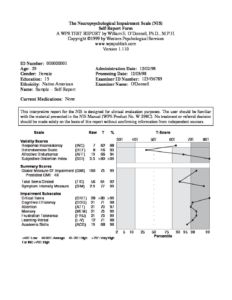
Neuropsychological Impairment Scale nis
For: Provides a quick, accurate picture of neuropsychological symptoms, eliciting relevant diagnostic information that might otherwise go unreported
Reading Level: Adult - Elder Adult
Format: Paper-and-Pencil, PC Based Software
Length: 15 - 20 minutes
Scoring: Hand Scored, Computer Scored
Kits
Click to browse products
Paper Forms & Handscoring Materials
Test forms, response booklets and scoring reference manuals.
PC Software
Click to browse products
NIS Kit
NIS Senior Interview Kit
NIS Manual
NIS Observer-Report Autoscore Answer Form (25)
NIS Self-Report Autoscore Answer Form (25)
NIS Senior Interview AutoScore Answer Form (25)
NIS 10-Use CD
NIS PC Answer Sheet (100)
Sample Reports
Authors
William E. O’Donnell, Ph.D., M.P.H., Clinton B. DeSoto, Ph.D., Janet L. DeSoto, Ed.D., and Don McQ. Reynolds, Ph.D.
Description
The NIS is a quick and convenient way to screen adults for neuropsychological symptoms. This brief self-report questionnaire addresses both global impairment and specific symptom areas, eliciting diagnostically relevant information that might otherwise go unreported. The NIS brings up symptoms that patients often fail to mention in an informal clinical interview. A useful addition to any general psychological evaluation, it is an efficient way to screen for organic problems. Serving as an “early warning system,” the NIS may identify areas for inquiry, focus treatment efforts and help determine whether the patient will benefit from therapy. It has proven particularly useful in assessing age- and AIDS-related dementia. Composed of 95 items, the NIS provides three very helpful summary scores, plus subscale scores and validity checks:
Global Measure of Impairment–serves as a general index of neuropsychological functioning.
Total Items Circled–distinguishes patients who report many low-intensity symptoms from those who report a few high-intensity symptoms.
Symptom Intensity Measure–alerts you to individuals with organic personality disorder, diminished affective experience, limited awareness of their impairments, or high levels of frustration or psychological distress.
Subscale Scores
Cognitive Efficiency
Attention
Memory
Frustration Tolerance
Learning-Verbal
Academic Skills
Validity Checks
Critical Items
Defensiveness
Affective Disturbance
Response Inconsistency
Subjective Distortion
The Subjective Distortion Check is particularly helpful as it tells you whether the client is under- or over-reporting symptoms.
Written at a fifth-grade reading level, the scale may be completed in just 15 to 20 minutes by anyone over the age of 17. Non-clinical norms, based on a sample of 1,000 adults (18 to 88 years old), are stratified by age (young adult, adult, middle-aged, and elderly). Clinical norms, drawn from a sample of 534 neuropsychiatric patients, are separated by diagnostic group (neurological, psychiatric, alcohol/drug, learning disability and physical trauma).
A second form of the NIS, the Observer Report, presents items in the third person. This non-standardised form, which may be completed by a relative or close friend of the patient, provides a different perspective on the patient’s symptoms. Comparisons of Self and Observer Reports may help the patient understand the impact of their deficits and help family members adopt realistic expectations.
A third form of the test, the Senior Interview, is useful with older patients who cannot complete the NIS Self-Report due to poor vision, strength, or manual dexterity. The Senior Interview consists of 40 questions that are read to the patient by the examiner. The patient indicates their response on a large-print visual cue card. This form provides a Global Measure of Impairment and scores for Defensiveness, Affective Disturbance, and Inconsistency. A Subjective Distortion Index can also be calculated if WAIS-R Digit Span and Similarities scores are available.
Efficient, comprehensive and systematic, the NIS offers many advantages over an informal clinical interview. It uncovers diagnostically important symptoms that people might otherwise omit or disregard.
NB: Prices are in Australian dollars inclusive of GST. NZ customers need to log in to view ex-GST prices.




